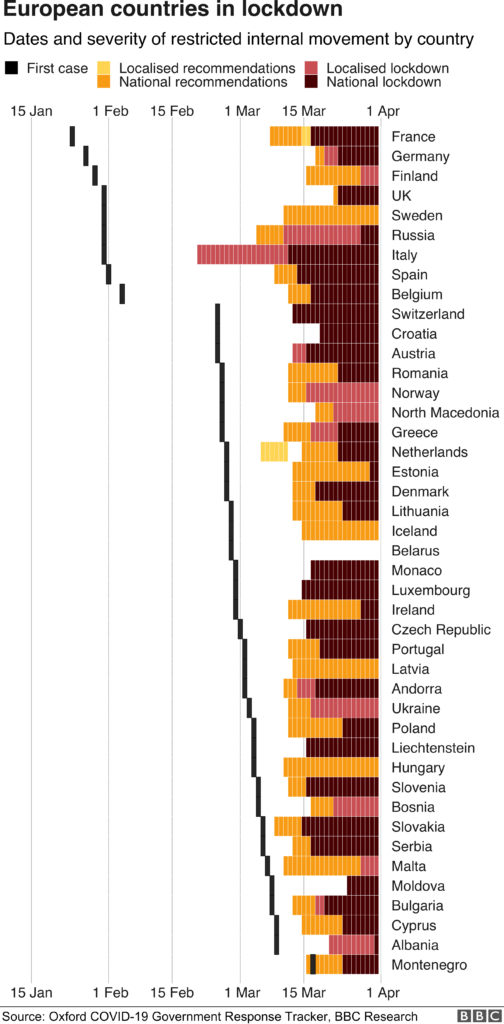
Looking back, the world should have locked down when China did in January. The reason we didn’t? Economics, business, commerce and the financial metrics. If we had? Well, we wouldn’t be suffering nearly as much now. But hey, hindsight is a great thing, isn’t it?
One of the things that struck me during all of this is the stark contrast between the USA and China. China, after initially trying to cover up there was something happening, locked down and provided full transparency to the world of what was going on. America tried to deny anything was going on, until it became too exposed to what was going on and had to lockdown too.
But my reflection on this, trying to avoid being too political, was the difference in cultures which drives such thinking. Y’see, the contrast struck me closer to home. My family moved two years ago to live near Warsaw, Poland, as my wife is Polish and we have two young boys who she wanted to have better access to health services than those available in the UK (which, as an NHS lover, I didn’t believe but now agree with). Meantime, I am British and watched the news daily about Boris Johnson saying wash your hands for twenty seconds whilst singing happy birthday to me. After Boris contracted the illness, I’m sure he’s regretting that flippancy back then now.
Anywho, the issue for me is that there was a lot of Q2 business planned and suddenly, with just 24 hours’ notice, the Polish government took a decision to shut down all air travel and borders. I argued with my wife at the time, accusing them of being extreme. She said: they’re just being safe.
I watched the USA and UK allowing flights, foreigners, travel, events, mingling with envy. Then they went into lockdown too.
Poland introduced one of the strictest lockdowns in Europe, and started that process from March 14 after identifying the first coronavirus case two weeks before. The UK went into lockdown towards the end of March after identifying the country’s first case at two months before.
A similar pattern with America and China, as in a relaxed attitude by the former until it was too late; a strict attitude by the latter, as soon as they fully realised what was going on. Checkout the BBC’s tracking of lockdowns for more.
Also, I think it’s notable that India locked down with four hours’ notice and hardly any coronavirus cases.
India seems to have sacrificed its economy to save lives.
The US seems to have sacrificed lives to save the economy. That's strange because we have always been told that human life is cheap in India, and so precious in the US! https://t.co/6CIo8dNaYk— Vikram Chandra (@vikramchandra) April 20, 2020
Interesting how the world has dealt with this, isn’t it?
The point that came home to me from my local perspective and global view is this: is it better to have a dictatorial patriarchal government that does some wrong or a laissez-faire matriarchical government that tries to do right?
The former is strict, disciplined, autocratic and treats citizens like children; the latter is open, free spirited, democratic and treats citizens like adults. The major difference between the two is also the way in which people accept things. In Poland and China, citizens may dislike the rules and procedures, but pretty much adhere to them straight away and follow them. In America and Britain, people don’t like any rules and procedures, and it takes a lot effort to get people to adhere to them. They might eventually, but will then complain about being bullied by a fascist state.
This is an additional reason why America and Britain locked down so late. The view is that people have freedom. The state should not bully them or dictate rules to them. That’s been the issue in this lockdown with many nations: freedom of the people versus minimising the impact of the coronavirus.
There’s more to it than that, obviously. For example, America and Britain locked down late partly because there may be the freedom of the people but there’s also the priority for profit. Trying to avoid impacting business and the economy, the ‘herd immunity’ idea prospered. The issue with that is that the herd immunity idea didn’t work (or did it?), and the result is that the emergence from the lockdown is far slower in a country that locked down late than in countries that locked down early. In other words, the later a country waited to lockdown, the bigger the impact on the economy.
Finally, one thought floating round is that countries run by women have fared far better than those run by men. Maybe.
Either way, whatever your politics and views, this virus has clearly shown different nations in different lights and I’m now not so bothered if the government dictates policies to me that I have to follow. Will I complain again in the future? Power to the people.
Chris M Skinner
Chris Skinner is best known as an independent commentator on the financial markets through his blog, TheFinanser.com, as author of the bestselling book Digital Bank, and Chair of the European networking forum the Financial Services Club. He has been voted one of the most influential people in banking by The Financial Brand (as well as one of the best blogs), a FinTech Titan (Next Bank), one of the Fintech Leaders you need to follow (City AM, Deluxe and Jax Finance), as well as one of the Top 40 most influential people in financial technology by the Wall Street Journal's Financial News. To learn more click here...



